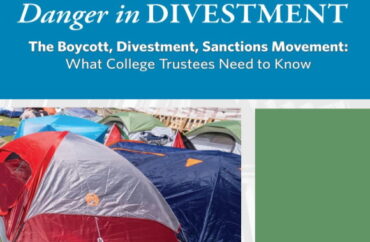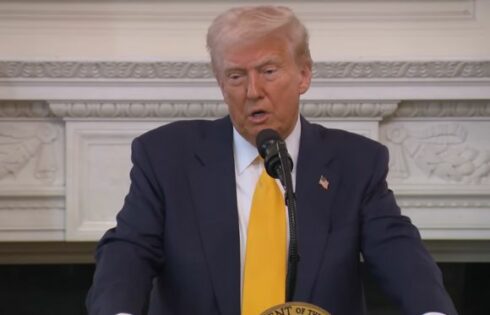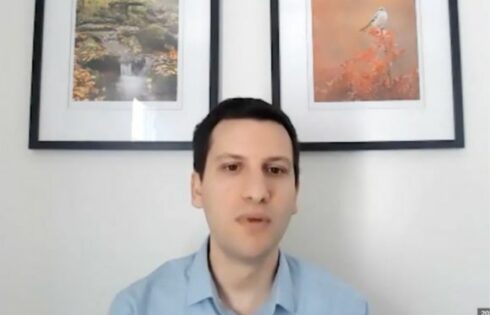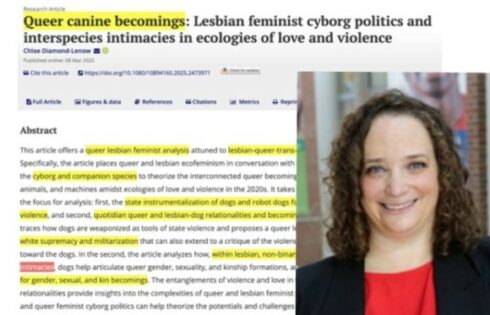
If a university has a strict institutional neutrality policy, then demands from aggressive and sometimes violent anti-Israel campus pro-Palestinian protesters are moot.
That’s the driving argument of a new 24-page guide titled “Danger in Divestment: The Boycott, Divestment, and Sanctions Movement and What Trustees Need to Know,” published this month by the American Council of Trustees and Alumni’s Institute for Effective Governance.
“The best defense against pressure to divest or to initiate an academic boycott is a strong board policy of institutional neutrality,” the report states. “Negotiation with students about divestment from Israel, or from any other nation, industry, or business, should be off the table.”
The “Danger in Divestment” report comes both as pro-Palestinian protesters are ramping up their efforts at the start of the 2024-25 school year — and a parade of colleges and universities are approving institutional neutrality policies.
The report cites the University of Chicago and Vanderbilt as examples of universities that have been able to cite institutional neutrality policies as a reason it cannot negotiate with the anti-Israel activists over the spring semester.
Simply put, a boycott of Israel “is inconsistent with institutional neutrality,” Daniel Diermeier, chancellor of Vanderbilt University, told NPR in April. “We’re not going to go there.”
Steve McGuire, an ACTA academic freedom scholar, said there are actually plenty of reasons trustees should reject calls for BDS.
“Financial decisions made for financial reasons are not political statements, and it is the duty of those responsible for an institution’s investments to make sound decisions that will provide a good return,” he told The College Fix via email. “Investments become political when factions within an institution attempt to use them as a vehicle for making symbolic political gestures, and that is what should be avoided.”
Anti-Israel student protestors called for universities to remove their holdings in Israel and to stop working with companies who do business with Israel, also known as divestment of holdings. Students in the spring of 2024 protested by camping in front of buildings, taking over university buildings, committing vandalism, and harassing students and faculty, the guide explains.
In fact, ACTA argues in a news release a divestment policy “would damage the institution’s ability to deliver financial returns it needs to support the entire campus community and be a breach of the trustees’ fiduciary obligation to the institutions they serve.”
Besides, McGuire said, it is “important to note that endowments are generally only invested in shares of individual companies or funds, not in nation-states.”
In effect, universities do not actually have investments in Israel, they just support companies that may or may not have holdings in Israel, a key difference.
“Divestment is also highly impractical as a financial strategy,” McGuire added, pointing out that to attempt to disentangle every investment with a particular country would be unrealistic given the complex multinational global economy.
Americans have lost confidence in higher education, “and one of the leading reasons is that colleges and universities have politicized themselves,” he said.
Furthermore, “colleges should also strive to remain neutral on as many issues as possible for the sake of free and open inquiry and truth-seeking,” he said.
“University officials should strive in all circumstances to adhere to neutrality as much as possible and only deviate from that position when absolutely necessary. When they do deviate from it, they should do so in as narrow and limited a fashion as possible,” McGuire said.
Just this month, USC, Johns Hopkins and the University of Texas system established institutional neutrality policies.
ACTA this month also published a guide titled “An Equal Space for All: A Trustee Guide to Preventing Encampments and Occupations on Campus.” It aims to help campus leaders navigate the anticipated anti-Israel protests on campuses this fall and serves as a complement to the divestment report.
Campus leaders must “enact clear, content-neutral time, place, and manner restrictions so that students and faculty understand in advance which activities are acceptable and which are not,” the group states on its website.
“ACTA recommends ensuring that the penalties for violating these restrictions are clear and enforcing them consistently, up to and including expulsion for egregious violations.”
IMAGE: Institutional neutrality implemented at USC, Purdue, Johns Hopkins, U. Texas system
IMAGE: ACTA
Like The College Fix on Facebook / Follow us on Twitter






Please join the conversation about our stories on Facebook, Twitter, Instagram, Reddit, MeWe, Rumble, Gab, Minds and Gettr.